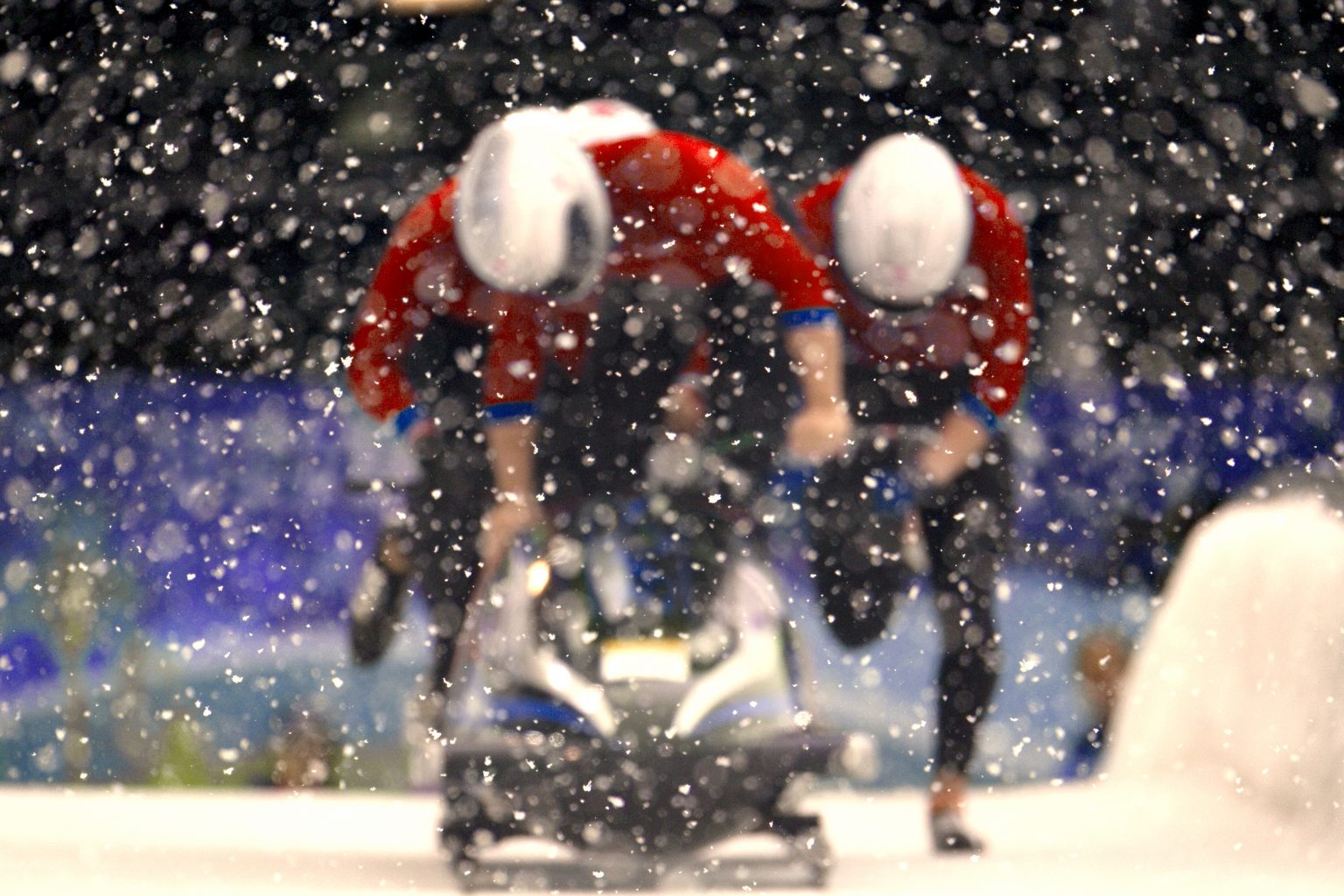Five Portuguese immigrants in Canada added up to chance, improvisation, overcoming obstacles, and achieving what seemed an impossibility: qualifying for the Calgary1988 Winter Olympic Games in bobsleigh, without ever having had their sled to compete on.
António Reis, João Poupada, Jorge Magalhães, João Pires, and Rogério Bernardes overcame the initial mistrust and, with their investment, the help of Toronto’s Portuguese community, tenacity, and a lot of preparation, Portugal returned to the Winter Games 36 years after their first participation.
António Reis, now 65, American soccer and rowing champion and political advisor, fell in love with the expensive sport. He couldn’t compete for Canada, but coach Joey Kilburn encouraged him to represent the Portuguese colors.
He was invited to participate in the World Cup and dragged his friend Jorge Magalhães along for the adventure, where they were received as strangers but didn’t do badly. “First we weren’t dead, then we were successful,” remembers António Reis, currently a marketing consultant.
It was then that the dream took wings: he recruited four students, all of them athletes and physically prepared, but with no experience in the sport, and in less than a year, they drew up a training and competition plan to be in Calgary1988 going at high speed down a narrow, winding ice track in a sled on blades.
There wasn’t even a federation in Portugal, and the Portuguese Olympic Committee (COP) only recognized the Bobsleigh Portugal team if the international federation did the same, and vice-versa. It was a ‘fish in the tail,’ but António Reis traveled the same day from Lisbon to Milan and, “with the goodwill of the COP,” the situation was unblocked.
“It was a dream, but with potential viability,” stresses the project’s mentor, in statements to Lusa news agency.
João Poupada, 56 years old, then a student of physiotherapy, American soccer player, jumper, and sprinter, admits that “at first I wasn’t sure if it was for real or not”, only when he saw the tickets for the first training session on a track he realized it was.
With limited resources, they practiced the timing of the start, a fundamental impulse for the race, on a sled with wheels. They took “the training very seriously,” although not under ideal conditions.
The emigrant community held dinners to raise funds, family members helped out, António stopped working to dedicate himself exclusively to this adventure, and they left for Innsbruck for the qualifying race with a sled lent by the Austrian federation, equipment that António Reis describes as “a piece of junk.
In the first two days of training, they realized that so much effort would be in vain, because the times didn’t allow them to qualify when the powers in the sport had sleds built “like a Formula 1”, but a bobsleigh salesman went to see the race and they ended up borrowing the car and trailer from the Australian team and left for Italy in search of a more competitive sled.
They arrived in Cortina d’Ampezzo at night, couldn’t find the salesman at home, searched for him until they talked to him in a café, agreed to buy the equipment, made the return trip to Austria at dawn, had an accident on the way, and ended the night polishing their skates, to enter the competition, where they improved by half a second.
“Our adventure is a series of improbabilities that ended well. It seems that everything came together to make it work. On Friday, the project was dead, by Saturday, my birthday, I was amazed, it looked like the ‘bob’ had an engine. We had never driven a new or quality, competitive ‘bob’ before,” says the pilot.
On Sunday, they were “euphoric”, after a qualification “legitimately achieved, with commitment and effort”, when the seller of the sled appeared to charge them the high price, which they had no way to pay. But the machine proved to be reliable and it was with it that Alberto do Monaco, ranked behind the Portuguese, presented himself at the Olympic Games.
“Everyone was amazed at the audacity, the audacity, the arrogance, and also the naivety of thinking we were going to the Olympic Games, but we were no longer idiotic dreamers, we were Olympic dreamers,” António Reis, a native of Gaia, told Lusa.
In Calgary, they felt everywhere the “pride of the Portuguese immigrants” who welcomed them warmly. In the Olympic village they were excited to see so many renowned “stars” up close, but in competition they had already raced with the best on the circuit and were integrated in the middle, where the Jamaican team was not so well received.
A group that does not correspond “to the caricature” made on film. “They were competent athletes,” assures the Portuguese driver.
If on the track they weren’t impressed, they felt crushed “with the weight” of entering the stadium at the opening ceremony. António resented the tight boots, “time stopped,” he felt nauseous and all he could think of was that he couldn’t drop the Portuguese flag he was holding at “such a great moment.
João Poupada, from Nazaré, told his father at the age of seven that he was going to the Olympic Games. He didn’t imagine that it would be in bobsleigh, which gave him the “defining moment” of entering the stadium.
The Pepsi employee doesn’t get nervous easily and was used to the pressure of the competition, but when they called Portugal, he asked his colleagues to push him if he froze.
- Ukraine: Yaremchuk says Ukrainian people will not forget applause at Estádio da Luz
- Feb 10, 2022 – Winners of Nazaré Tudor Challenge
- Olympics: Portuguese bobsleigh team movie coming?
The Portuguese depreciate the used and non-competitive equipment, rented in Ontario, with which they performed in Calgary1988, and the quartet Reis/Poupada/Pires/Bernardes would be 25th out of 26 competitors, the duo Reis/Poupada 34th out of 38 participants, and Magalhães and Pires rolled over and didn’t finish.
João Poupada, who perpetuated this epic with a tattoo on his arm, is proud that they “did their best” and “didn’t embarrass the Portuguese.
“The miracle is that we were in the Olympic Games, not because we didn’t deserve it, but because we did much more than imagined,” remarks António Reis, in statements to Lusa.
Artigo em Português
Cinco portugueses competiram contra as probabilidades no bobsleigh em Calgary1988
Cinco portugueses emigrados no Canadá somaram acasos, improvisos, ultrapassam obstáculos e concretizaram o que parecia uma impossibilidade: qualificarem-se para os Jogos Olímpicos de Inverno Calgary1988 no bobsleigh, sem nunca terem tido um trenó próprio para competirem.
António Reis, João Poupada, Jorge Magalhães, João Pires e Rogério Bernardes venceram a desconfiança inicial e, com investimento próprio, a ajuda da comunidade portuguesa de Toronto, tenacidade e muita preparação fizeram Portugal regressar aos Jogos de Inverno 36 anos depois da primeira participação.
António Reis, hoje com 65 anos, campeão de futebol americano, de remo e assessor político, apaixonou-se pelo dispendioso desporto. Não podia competir pelo Canadá, mas o técnico Joey Kilburn encorajou-o a tentar representar as cores lusas.
Foi convidado a participar na Taça do Mundo e arrastou o amigo Jorge Magalhães para a aventura, na qual foram recebidos como estranhos, mas não se saíram mal. “Primeiro, não estávamos mortos, depois, fomos bem-sucedidos”, recorda António Reis, atualmente consultor em marketing.
Foi então que o sonho ganhou asas: recrutou quatro estudantes, todos eles desportistas e com preparação física, mas sem experiência na modalidade, e em menos de um ano desenharam um plano de treino e competição para conseguirem estar em Calgary1988 a descer a alta velocidade uma pista de gelo estreita e sinuosa num trenó sobre lâminas.
Em Portugal, nem sequer havia federação e o Comité Olímpico de Portugal (COP) só reconhecia a equipa Bobsleigh Portugal se a federação internacional também o fizesse e vice-versa. Era uma ‘pescadinha de rabo na boca’, mas António Reis viajou no mesmo dia de Lisboa a Milão e, “com a boa vontade do COP”, a situação foi desbloqueada.
“Era um sonho, mas com uma viabilidade potencial”, salienta o mentor do projeto, em declarações à agência Lusa.
João Poupada, 56 anos, então estudante de fisioterapia, jogador de futebol americano, saltador e velocista, admite que “no início não tinha a certeza se era a sério ou não”, só quando viu os bilhetes para o primeiro treino numa pista percebeu que sim.
Com recursos limitados, treinaram o sincronismo do arranque, impulso fundamental para a corrida, num trenó com rodas. Levaram “o treino muito a sério”, embora não nas condições ideais.
A comunidade emigrante fez jantares para angariar fundos, os familiares ajudaram, António deixou de trabalhar para se dedicar em exclusivo a esta aventura e partiram para Innsbruck, para a corrida de qualificação, com um trenó emprestado pela federação austríaca, um equipamento que António Reis descreve como “uma sucata”.
Nos primeiros dois dias de treino perceberam que tanto esforço seria em vão, porque os tempos não lhes permitiam a qualificação, quando as potências na modalidade tinham trenós construídos “como uns Fórmula 1”, mas um vendedor de bobsleigh foi ver a prova e acabaram por pedir emprestado o carro e o reboque à equipa australiana e partiram para Itália, à procura de um trenó mais competitivo.
Chegaram a Cortina d’Ampezzo de noite, não encontraram o vendedor em casa, procuraram-no até falarem com ele num café, acordaram a compra do equipamento, fizeram a viagem de regresso à Áustria de madrugada, tiveram um acidente pelo caminho e terminaram a noite a polir os patins, para entrarem em competição, onde melhoraram meio segundo.
“A nossa aventura é uma série de improbabilidades que acabaram bem. Parece que tudo se conjugou para que resultasse. Na sexta-feira, o projeto estava morto, no sábado, dia do meu aniversário, estava espantado, parecia que o ‘bob’ tinha motor. Nós nunca tínhamos conduzido um ‘bob’ novo ou de qualidade, competitivo”, conta o piloto.
No domingo, estavam “eufóricos”, depois de um apuramento “legitimamente conseguido, com comprometimento e esforço”, quando lhes apareceu o vendedor do trenó para cobrar o elevado valor, que eles não tinham como pagar. Mas a máquina mostrou ser fiável e foi com ela que Alberto do Mónaco, classificado atrás dos portugueses, se apresentou nos Jogos Olímpicos.
“Todos ficaram admirados com o atrevimento, a audácia, a arrogância, também a ingenuidade, de acharmos que íamos aos Jogos Olímpicos, mas ali já não éramos sonhadores idiotas, éramos sonhadores olímpicos”, salienta, à Lusa, António Reis, natural de Gaia.
Em Calgary, sentiram por todo o lado o “orgulho dos emigrantes portugueses”, que os receberam calorosamente. Na vila olímpica entusiasmaram-se ao verem de perto tanta ‘estrela’ de renome, mas em competição já tinham corrido com os melhores do circuito e estavam integrados no meio, onde a equipa jamaicana não foi tão bem recebida.
Um grupo que não corresponde “à caricatura” feita em filme. “Eram atletas competentes”, garante o piloto português.
Se na pista não se deixaram impressionar, sentiram-se esmagados “com o peso” da entrada no estádio, na cerimónia de abertura. António ressentia-se das botas apertadas, “o tempo parou”, sentiu náuseas e só pensava que não podia deixar cair a bandeira portuguesa que empunhava num “momento tão grande”.
João Poupada, natural da Nazaré, disse aos sete anos ao pai que ia aos Jogos Olímpicos. Não imaginava que fosse no bobsleigh, que lhe proporcionou o “momento marcante” da entrada no estádio.
O funcionário da Pepsi não se enerva facilmente e estava habituado à pressão da competição, mas quando chamaram Portugal, pediu aos colegas que, se paralisasse, o empurrassem.
Os portugueses desvalorizam o equipamento usado e não competitivo, alugado em Ontário, com que se apresentaram em Calgary1988, e o quarteto Reis/Poupada/Pires/Bernardes ficaria em 25.º entre 26 concorrentes, a dupla Reis/Poupada em 34.º entre 38 participantes e Magalhães e Pires capotaram e não terminaram.
João Poupada, que perpetrou essa epopeia com uma tatuagem no braço, orgulha-se de terem “feito o melhor” e “não terem embaraçado os portugueses”.
“O milagre é que nós estávamos nos Jogos Olímpicos, não porque não merecíamos, mas porque fizemos muito mais do que o imaginado”, remata António Reis, em declarações à Lusa.
AYR // AMG
Lusa/Fim


